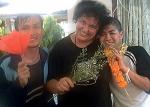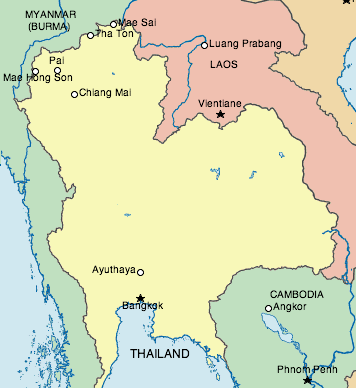Inconsistent Thai Values
Thursday, April 28th, 2005After nearly a dozen visits and about six months time in the city, over the last several years, we have gotten to know Bangkok a little. In this city with a population of over 9 million people we can get anywhere we want to go…as long as our destination is near the Skytrain, subway line and boat ramps or as long as we can communicate with the taxi driver. Haven’t braved the buses yet but we do take the motorcycle taxis back and forth down Sukhumvit 22 to our dentist at the end of the street…surely risking our lives in the process!
It’s interesting to watch the people embarking public transportation in Bangkok. They stand politely aside as they wait for debarking travelers to get off before they step into the trains. (In China it’s an all out battle of people coming off against the people trying to get on!) Once on, people are usually very respectful…if they are Thai…careful not to bump each other.
One jaw-dropping gesture, for an American, is that anytime a small child embarks a crowded Skytrain or subway car with packed adults standing cheek to jowel, the nearest adult of any age will quickly jump up and invite the child to take his/her seat…leaving the beaming child to look up at it’s parent as if to say, I am really special today aren’t I?
We have never experienced a culture that has such implicit respect for their little ones. You never see adults scowling at children or admonishing them…in public at least. Children always get an admiring glance and an enthusiastic accommodation from adults around them. The interesting result is that you never see an unruly child. This is very humbling to observe. At home we often see parents humilating their children in public by yelling, shaking and even slapping or spanking them.
On the other hand, it is common for young women in small villages to leave their children in the care of others while they exchange sexual favors in Bangkok. A pretty young woman who was perming my hair, works in an upscale hotel beauty salon during the day and as a bar girl at night…her parents left to care for her two children in her northern Isaan village. It has been said that as many as one out of thirty very poor young women, who do not consider themselves prostitutes, will trade sex for money, dinner and shopping from the nearest Western or Japanese or Korean “ATM man.”
This activity often has more than the usual side effects however. Sadly, Thai women are often overcome with depression. It has been said that once Thai women consort sexually with a Westerner, the local Thai men will not have anything to do with them and they often remain single and without any way of supporting themselves. The Bangkok Post this week reported on a 23 year old young woman who had jumped from the Skytrain to her death on the pavement below because, her friend reported, her Western “boyfriend” had just broken up with her. From the point of view of the Western male, the gratitude and soft sensuous, accommodation of the Thai woman is a welcome relief.
I asked my friend, Jiraporn, a university professor here, who lived ten years in the States, what she thinks about this. “They are young and don’t know what they are doing. “Village families are poor and need the money the girls send home so everyone just turns their heads, she whispered kindly.


 As soon as we returned to Bangkok from Bali Bob took a train to Chiang Mai for a trek in northern Thailand near Mae Son Hong. I stayed in Bangkok to have some ...
As soon as we returned to Bangkok from Bali Bob took a train to Chiang Mai for a trek in northern Thailand near Mae Son Hong. I stayed in Bangkok to have some ...